Data breaches have become common headlines! One moment, you're going about your day; the next, you receive an alarming notification: your email address has been found on the dark web.
But before panic sets in, it is important to know how to respond decisively. In this guide, we will discuss the immediate steps to secure your accounts, assess damage, and protect your PII (Personally Identifiable Information).
Are You at Risk If Your Data is Found on the Dark Web?
Hackers routinely exploit the Dark Web as a marketplace to anonymously share, sell, and trade sensitive data that can be weaponized for cyberattacks, financial fraud, and identity theft. If your email address is circulating on the Dark Web, it is often the result of a data breach.
Once your email surfaces on the Dark Web, it can be used to:
- Create fake profiles by correlating your home address, phone number, Social Security number (SSN), and financial information.
- Your email can be used to deliver highly convincing phishing messages, increasing the likelihood that you might unknowingly disclose sensitive information or credentials.
- Access your email to get workplace accounts and networks, used for data exfiltration, corporate espionage, or extortion schemes.
- By spoofing your email address, attackers can deceive your colleagues, friends, or family.
- In severe cases, aggregated data from multiple breaches can enable fraudsters to impersonate you entirely, draining your financial accounts, taking out loans in your name, or conducting other forms of identity fraud.
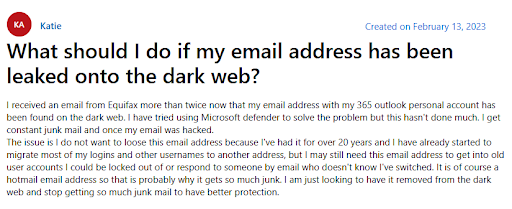
8 Signs to Know if Your Email Address Has Been Leaked & Could Be On the Dark Web
You can guess if your email address is being used without your authority by looking for these signs:
- Your account was logged in from various places and devices you do not recognise.
- You have received password reset requests that you did not generate.
- Some emails were deleted or marked as read in your inbox.
- Your friends or contacts have received spam emails from your account.
- You have received emails from the provider about suspicious login attempts.
- If your password suddenly stops working, a hacker may have changed it.
- Changes to linked accounts suggest a red flag.
- A sudden rise in phishing attempts or spam emails occurs after you have been a part of a data breach.
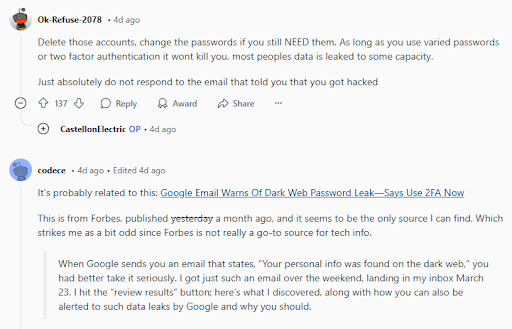
How To Find Out If Your Email Is on the Dark Web?
If you notice the signs mentioned above, then there is a chance that your email address and other personally identifiable data, such as SSN, address, and credit card details, are on the dark web.
You can discover if your email address is on the dark web with PureVPN’s Dark Web Monitor.
Here is what you need to do:
- Go to the PureVPN website.
- Enter your email address in the bar and click Scan Now.
- You will get free, customized details about the privacy status of your email.
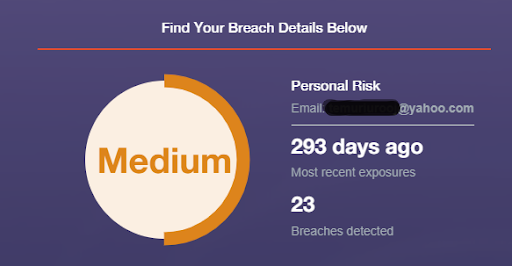
What To Do If Your Email Address Is on the Dark Web?
It is important to take immediate action if you suspect that your email address has been leaked on the dark web. You must immediately:
1. Change Your Email Password Immediately
If your email was exposed in a data breach, it is important to change the password immediately. Try to keep it difficult, unguessable, and a combination of letters & characters for your password.
2. Enable Two-Factor Authentication (2FA)
Enable Two-Factor Authentication on your email and other accounts as an additional security.
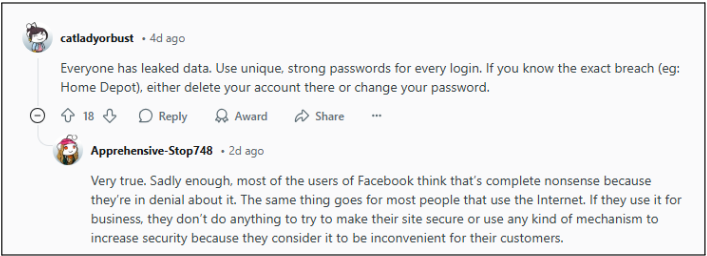
3. Check for Unauthorized Account Access
Regularly check your email account's login history for any unusual activity, such as logins from unrecognized locations or devices. Immediately log out of all sessions to secure your account.
4. Monitor Your Other Online Accounts
Check for any unauthorized changes if your email is linked to banking, social media, or shopping accounts.
5. Be Wary of Phishing Attempts
Stay alert if you receive any unexpected emails, as scammers may frequently exploit compromised accounts to send phishing messages.
6. Scan Your Device for Malware
Immediately run a comprehensive security scan if you have unintentionally opened any suspicious links.
7. Report the Scam to Your Email Provider
Report phishing attempts and suspicious activity to the email provider to prevent similar scams.
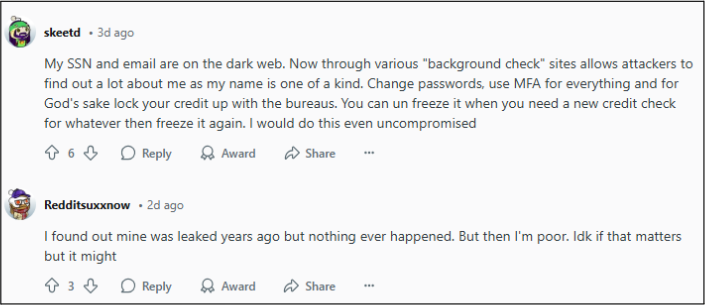
8. Warn Your Contacts
Notify your friends, family, and colleagues about the scams and phishing attempts.
9. Consider Using a Separate Email Address for Sensitive Information
Use a separate email address for online transactions or signing up for private services to limit the exposure of your primary email address.
Protect and Prevent Your Data from Exploitation with PureVPN
If your essential data, including your email address, social accounts, passwords, and more, is used without your knowledge, there is a chance that it might be shared, sold, and used multiple times for malicious intent.
Besides being cautious about your account activity, you must get a 360-degree solution for your privacy protection. With PureVPN, you can manage your data easily.
- Get a real-time privacy score about how vulnerable your data is.
- Manage your social media privacy with customised recommendations.
- Enable tracker blocker to avoid unnecessary tracking.
- Delete your essential data from data brokers to limit unwanted advertisements.
Enable Dark Web Monitoring on PureVPN
You must protect your data from ending up on the dark web. Here’s what to do:
- Sign up for PureMax.
- Download and install the PureVPN app.
- Log in to your account and select Dark Web Monitoring.
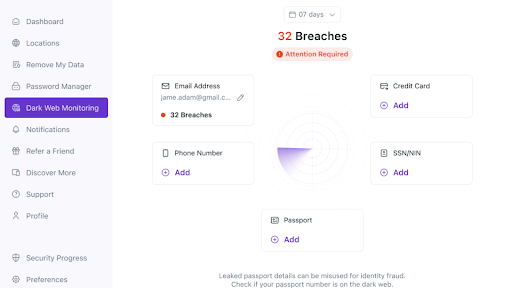
- Select Add Assets to Monitor and add your email address, SSN/NIN, credit card number, passport number, and phone number.
- Enter the code sent to your registered number, and you’re done.
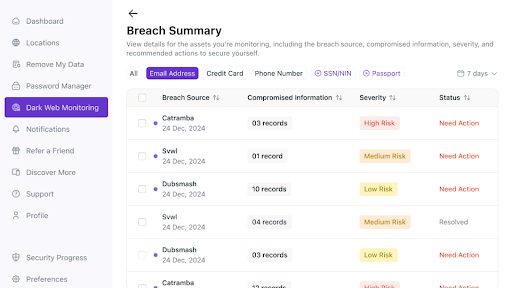
- Follow the recommended measures if your data is part of a breach to prevent further misuse.
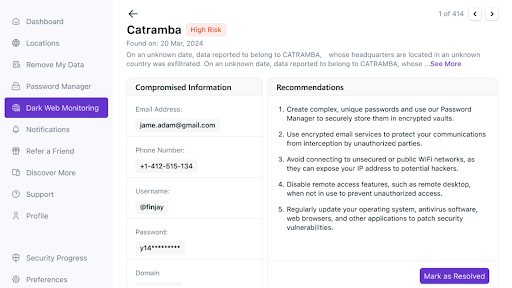
Wrap Up
Data is an important asset, and people on the dark web are looking for it at all times. If you think your email address or other critical identifiers have been leaked on the dark web, it is important to track the sharing of your data without your authority with PureVPN’s dark web monitor.
Frequently Asked Questions
-
Can you remove your email address from the dark web?

Removing your email from the dark web is generally not possible. Once information is out there, it can be copied and distributed across various hidden services. You can mitigate the risks associated with your exposed email address by using strong, unique passwords for all your accounts, enabling two-factor authentication, and being extra vigilant for phishing attempts.
-
Should I worry if a scammer has my email address?

Yes, you should be concerned if a scammer has your email address. While having just your email alone might not allow them direct access to your accounts, it's a valuable piece of information for phishing campaigns, spamming, and identity theft attempts.
-
What to do if my email was in a data breach?

First, identify which data breach exposed your email address by using PureVPN dark web monitoring. Once identified, immediately change the password, enable two-factor authentication, and be vigilant for phishing emails and other scam attempts.
-
What to do if my info got leaked onto the dark web?

If your information has been leaked onto the dark web, take immediate action to secure your accounts. Change passwords for all your important online accounts, monitor your financial accounts and credit reports for any suspicious activity, and scan your data through PureVPN dark web monitoring to know which information has been leaked.
-
How do I remove my email from the scammer list?

If you have been a part of a data breach, then your data might be used for scams you are not aware of. Although it is almost impossible to remove your data once compromised, you can stay vigilant by looking for some red flags, changing your passwords, monitoring your account activity, and limiting the sharing of your data would help.



